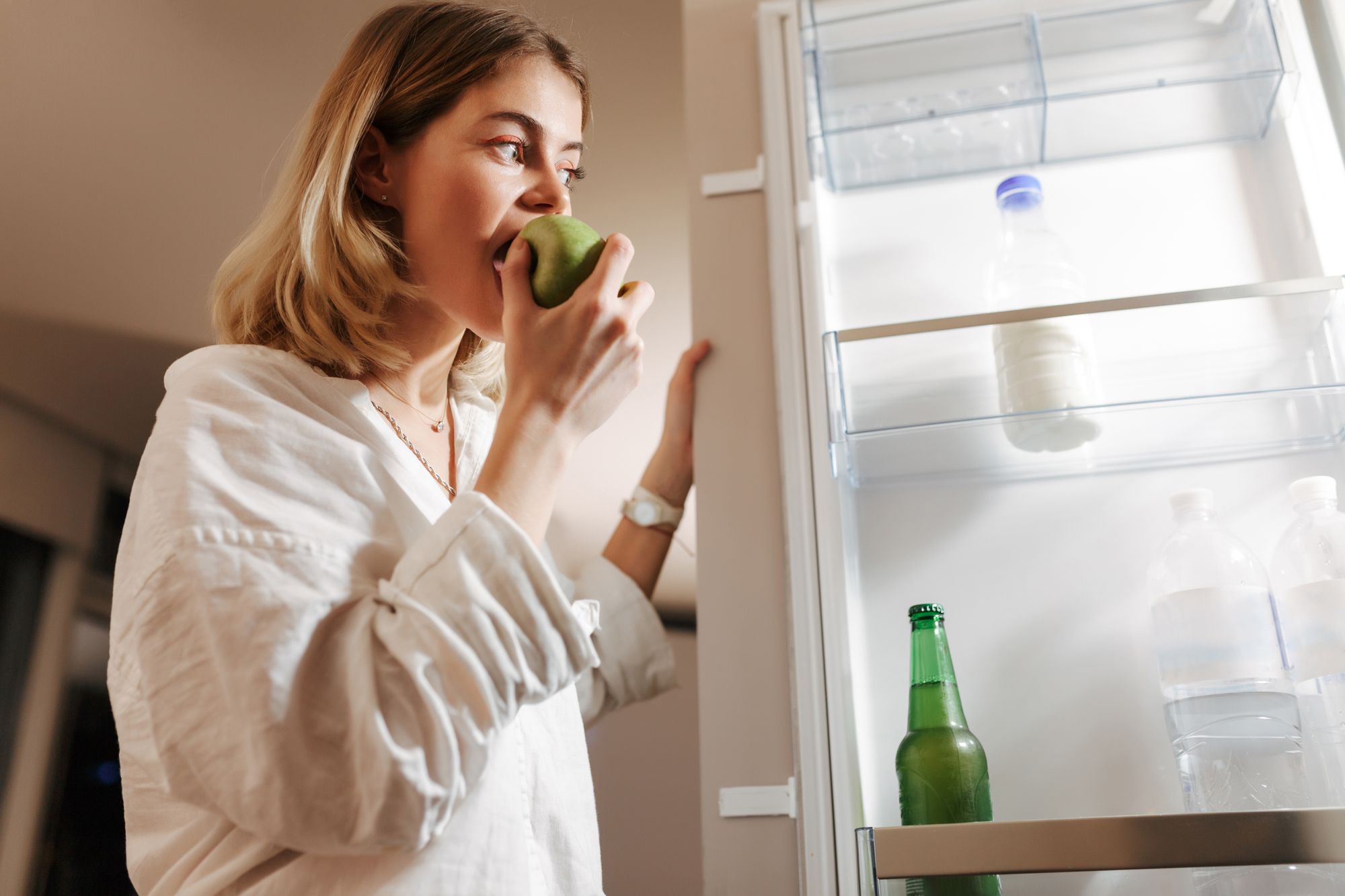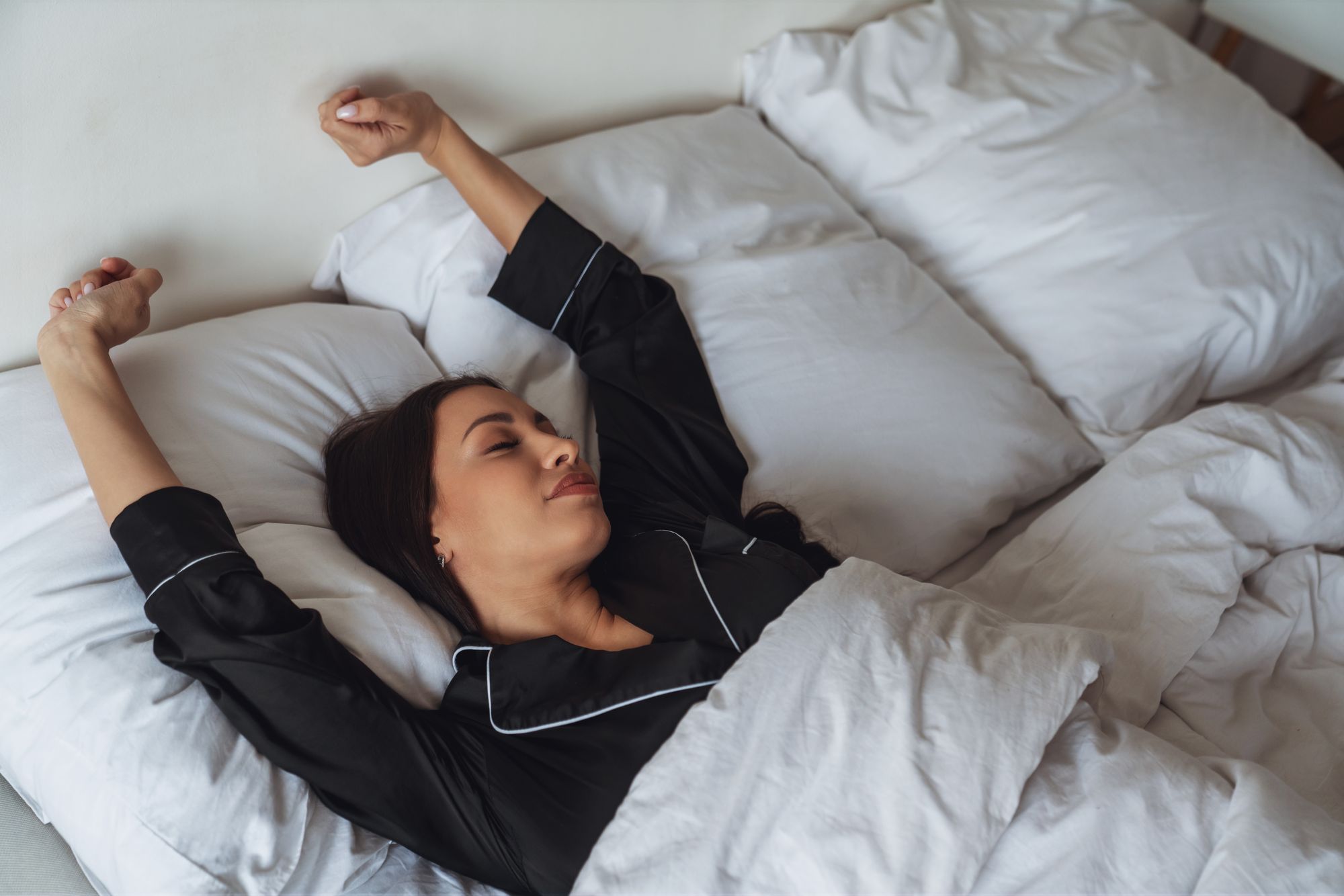
Does staying up late cause weight gain, and how else can sleep habits impact your weight? Some people are genetically predisposed to being night owls because they have a late chronotype that sets their natural sleep pattern as such. Other people have circadian rhythm disorders, or simply enjoy staying up late.
Either way, staying up late (being a night owl) is very common.
The question is whether our sleeping habits can have an impact on our weight. Does staying up late cause weight gain or make it harder to maintain a healthy weight?
After all, late-night snacking is much more common than early morning snacking. Many of us are wired to snack at night. If we were asleep instead of awake, would we end up eating less calories in a day?
It’s commonly believed that staying up late will cause us to pack on a few pounds, but is there any scientific evidence to suggest that staying up late causes weight gain or leads to overeating? Can going to bed earlier actually help us achieve a healthier weight? In this guide, we take you through everything you need to know to navigate this slightly complex topic.

Does Staying Up Late Cause Weight Gain? How Sleep Impacts Your Metabolism
As adults, we need a good eight hours of sleep per night in order to be well-rested and refreshed. When we don’t get enough sleep, studies have shown that this can have a negative impact on our metabolism.
The study showed that the resting metabolic rate for late sleepers who weren’t getting enough sleep was much lower in the morning than those who had got a full eight hours. This is because the body was conserving energy due to the lack of sleep, which slowed metabolism.
When the metabolism slows down, it means that we aren’t burning through the energy that we have consumed as quickly as we normally would. As a result, our body stores fat, and this can lead to us putting on weight. In fact, the aforementioned study suggests that late sleepers could be putting on as much as two pounds per month.
The good news is that once you catch up on your sleep and you regain a healthy pattern of rest, the same study showed that your metabolism will likely recover and go back to normal. The change isn’t permanent, and this is good news if you want to lose any weight gained through sleep deprivation.
It should be noted that not everyone who stays up late is sleep deprived. You might be staying up late, but also sleeping in, which means you’re still getting 8 hours of sleep per night (roughly) despite being a night owl. But other people who stay up late have corporate jobs that require them to be at work early in the morning, so their sleep deprivation could cause weight gain.
Can Going to Bed Late Cause Overeating or Weight Gain?
The complexity here is that going to bed late alone can’t cause weight gain. It’s more about your habits (such as your eating habits or drinking habits) while you’re staying up late.
You can go to bed at 2:00 AM, and as long as you are getting enough sleep, it won’t impact your metabolism. It’s the potential lack of sleep that sometimes causes weight gain or a slower metabolism.
We all have different cycles and daily schedules, and if yours means that you go to bed at 2:00 AM and wake up at 10:00 AM, that won’t impact your weight because it means you are still getting enough sleep, and giving your body the rest and recovery period that it needs.
That brings us to the next question – can going to bed earlier help you lose weight? Again, it’s not a cut-and-dry answer. If you’re not getting a full night of sleep because you always have to get up early for work, hitting the hay earlier will definitely help you to lose weight and bring your metabolism back to a normal level. However, if you were already getting plenty of rest, then an earlier bedtime might not have much impact on your weight.
Why Do We Get So Hungry at Night?
Night owls are notoriously hungry late at night, and it does leave people wondering why we get so much hungrier at night. A lot of the time, it is us eating out of boredom or because it has become a habitual ritual that we undertake as part of our daily routine.
It’s common knowledge that late-night snacking is a bad habit many people have. Check out this article on how to stop late-night snacking when you’re alone in the house.
A 2022 study on time of day differences in appetite indicated that the participants’ desire to eat and ghrelin levels were greater in the evening hours. Ghrelin is the hunger hormone that stimulates your appetite and makes you feel hungry. It’s common to have higher levels of ghrelin at night time.
Studies have also shown that extreme eating habits at night could be linked to binge eating and night eating syndrome (two common eating disorders), as well as feelings of depression, anxiety, and frustration. It is common for people to eat their feelings and engage in emotional eating, and at night we are often feeling these emotions in a more heightened state – especially if we are feeling lonely.
Night eating syndrome is interesting because those who suffer from this condition will eat around 25% or more of their daily calories at nighttime – often grazing on snacks in the late hours of the night. In this case, people with night eating syndrome usually don’t have much of an appetite during the day, and can overeat at night.
Outside of this, the most common reasons for being so hungry at night are emotional reasons. Much of the time, it’s because you aren’t fulfilling something your mind and body need (more mental stimulation, for example, or emotional intimacy) and so you instinctively fill the void with food. Filling up that empty feeling with food is instinctive, because it’s something to do when your body and mind can’t determine what’s missing.
How can you combat this? Well, going to bed earlier can be a massive help in combating the bad habit of late-night snacking.
Since late-night snacking is strongly attributed to weight gain, it will help you keep the pounds off if you go to bed earlier.
If you naturally simply aren’t tired at night, try taking melatonin or CBD oil, or some other natural sleep aid.

Emotional Eating at Night time
To expand on why emotional eating is so common late at night, we should discuss reasons why people feel more emotional at night compared to during the day.
For one thing, at night you are more likely to be alone with your thoughts, less distracted, less busy, somewhat bored, and perhaps quite lonely.
Feelings of sadness tend to creep in late at night, whereas during the day we may have been more distracted, busy, or focused on other things such as our to-do list for the day.
It’s important to understand that when we feel stressed, sad, lonely or depressed, we aren’t actually hungry for food. We’re hungry for human connection, validation, intimacy, and a whole bunch of other things that food won’t fix.
Getting a handle on emotional eating often requires a lot of therapy, inner work, mindful eating practices, self-discipline, self-awareness, and it takes time. It’s definitely a lot more common to ‘eat your feelings’ at night time, so perhaps going to bed earlier is the key to engage in this harmful habit less often.
Overeating late at night and emotional eating are disordered eating behaviors. It doesn’t mean you have a full-on eating disorder, but it is a sign that you have unhealthy eating patterns that could lead to weight gain.
Does Going to Bed Late Affect Children As Well?
Absolutely, and children are more at risk than adults in some ways. It wasn’t until recently that people started taking the notion that children, teenagers, and young adults need more sleep than full-grown adults. In fact, teenagers need an easy 10 hours of sleep per night in order to thrive and help their brains develop.
Studies on teenagers and young adults have shown that those who go to sleep later on a weeknight are more likely to gain weight as a result of a lack of sleep. They are also more likely to consume higher quantities of fast food which, when combined with sleep deprivation, was shown to impact weight gain.
While more research needs to be undertaken on younger children to determine if there is a link between weight gain and a lack of sleep, the current evidence that’s available for teenagers and adults would strongly suggest that it would be the same for them.
Does Sleep Deprivation Impact Your Appetite?
There has been a lot of research on the way in which sleep deprivation impacts our appetite, and the short answer is that we are more likely to snack and consume more calories than we need if we are sleep deprived.
Some studies have shown that those who had severely restricted sleep (four hours per night as opposed to ten) were more likely to eat more and consumed an average of 550 calories between 10 pm and 4 am. This also led to them gaining around two pounds by the end of the experiment.
Further studies showed how a lack of sleep can hinder the way in which the endocannabinoid system works (which is responsible for our appetite control and various other functions in the body). It led to a lack of self-control, which meant that those who didn’t get enough sleep had a higher propensity for snacking on those delicious forbidden midnight snacks.
As further support for these findings, additional research was able to find evidence for sleep deprivation hindering the production of hormones that are responsible for hunger and feelings of fullness. As a result of this, those who didn’t get enough sleep were more likely to not only snack but also indulge in much larger portion sizes.

How Can You Improve Your Sleep Schedule?
If you want to avoid potential weight gain from staying up late, there are some things you can do in order to try and improve your sleep cycle. This includes:
- Staying active during the day, and getting daily exercise.
- Keeping a fairly consistent daily schedule and routine.
- Mastering a good bedtime routine and proper sleep hygiene.
- Switching off electronics and dimming the lighting two hours before you want to go to bed.
All of these tips can work for children and adults alike, and turning off your electronic devices is an important one. This is because the blue light from the screen can disrupt our circadian rhythm and massively impact our sleep quality (in a negative way) as well as keep us feeling awake.
How Can You Curb Your Night time Appetite?
Does staying up late cause weight gain if you learn how to control your nighttime appetite? Not so much.
If you want to tackle your midnight snacking habit (a detrimental habit that we should all strive to get rid of), there are several different pieces of advice we have for you:
- Eat three healthy meals per day and have dinner before 7:00 PM.
- Drink two cups of water when you want to eat at night, as sometimes thirst is mistaken for hunger.
- Don’t keep junk food in the house.
- Brush your teeth late at night when you feel a craving (it works for many people).
- Keep your mind (and hands) occupied until bedtime with crocheting, art, or writing.
- Try following an intermittent fasting program where your eating window ends at 8:00 PM.
To Conclude
Sleep and all of the ways different sleep habits impact our health is quite fascinating, and so is the way in which our bodies work. It’s a relief to know that staying up late isn’t the sole cause of weight gain, but rather the potential lack of sleep that comes with it, and one’s late-night eating habits. As long as you are getting your eight hours of sleep and controlling your appetite at night, you aren’t going to pack on the pounds, and you can stay up as late as you like.
If you’re self-employed and you can start work at whatever time you like, it’s not a huge deal to stay up late and sleep in.
It’s all about maintaining a balanced lifestyle that ensures you’re taking care of your body and mind. The science and advice we have here should provide the perfect stepping stones for building a healthier routine that allows you to get adequate sleep.
Find out your genetic sleep habits with a CircleDNA test. You’ll find out if you’re genetically more likely to be a night owl, and other information about your sleep habits, your stress management habits, and your genetic appetite control.
References:
-
Journal of Obesity, Resting metabolic rate varies by race and by sleep duration: https://onlinelibrary.wiley.com/doi/10.1002/oby.21198
-
National Library of Medicine, Time of day differences in appetite and gut hormone responses to meal and stress challenges in adults with normal-weight and obesity: https://pubmed.ncbi.nlm.nih.gov/35750246/
-
CDC, Sleep in Middle and High School Students: https://www.cdc.gov/healthyschools/features/students-sleep.htm
-
Oxford Academic, Evidence for a Possible Link between Bedtime and Change in Body Mass Index:
https://academic.oup.com/sleep/article/38/10/1523/2468593?login=false -
Oxford Academic, Effects of Experimental Sleep Restriction on Weight Gain, Caloric Intake, and Meal Timing in Healthy Adults: https://academic.oup.com/sleep/article/36/7/981/2453923?login=false
-
Oxford Academic, Sleep Restriction Enhances the Daily Rhythm of Circulating Levels of Endocannabinoid 2-Arachidonoylglycerol: https://academic.oup.com/sleep/article/39/3/653/2454026?login=false
-
Science Direct, Acute sleep deprivation increases portion size and affects food choice in young men:
https://www.sciencedirect.com/science/article/pii/S0306453013000176?via%3Dihub -
NCBI, Binge eating disorder and night eating syndrome: a comparative study of disordered eating:
https://pubmed.ncbi.nlm.nih.gov/16392984/ -
NCBI, The Effect of Hunger and Satiety on Mood-Related Food Craving:
https://www.ncbi.nlm.nih.gov/pmc/articles/PMC7667273/







Comments are closed.